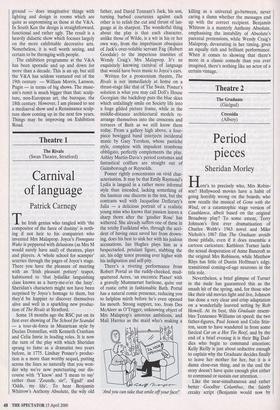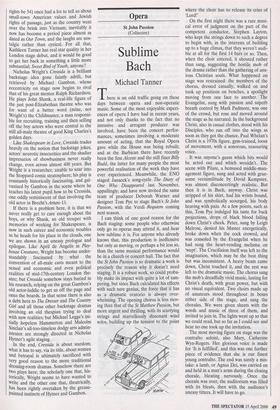Theatre 2
The Graduate (Gielgud)
Cressida (Albery)
Period pieces
Sheridan Morley
Here's to precisely who, Mrs Robin- son? Hollywood movies have a habit of going horribly wrong on the boards; who now recalls the musical of Gone with the Wind, or a catastrophic stage version of Casablanca, albeit based on the original Broadway play? To some extent, Terry Johnson's first ever dramatisation of Charles Webb's 1963 novel and Mike Nichols's 1967 film The Graduate avoids those pitfalls, even if it does resemble a cartoon caricature. Kathleen Turner lacks the sexual desperation of Anne Bancroft as the original Mrs Robinson, while Matthew Rhys has little of Dustin Hoffman's edgy, transitional coming-of-age neuroses in the title role.
Nevertheless, a brief glimpse of Turner in the nude has guaranteed this as the smash hit of the spring, and, for those who like their old movies light and live, Johnson has done a very clear and crisp adaptation on a wonderfully louvred setting by Rob Howell. At its best, this Graduate resem- bles Tennessee Williams on speed; the two father-figures, Paul Jesson and Colin Stin- ton, seem to have wandered in from some farcical Cat on a Hot Tin Roof, and by the end of a brief evening it is their Big Dad- dies who begin to command attention; Kelly Reilly is just about seductive enough to explain why the Graduate decides finally to leave her mother for her, but it is a damn close-run thing, and in the end the story doesn't have quite enough plot either to command or sustain our attention.
Like the near-simultaneous and rather better Goodbye Columbus, the faintly creaky script (Benjamin would now by rights be 54) once had a lot to tell us about small-town American values and Jewish rights of passage, just as the country went over the brink into Vietnam; inevitably it now has become a period piece almost as dated as Our Town, and the laughs are nos- talgic rather than cynical. For all that, Kathleen Turner has real star quality in her London stage debut, and it would be good to get her back in something a little more substantial; Sweet Bird of Youth, anyone? Nicholas Wright's Cressida is a brilliant backstage idea gone faintly adrift, but retrieved by Michael Gambon, whose eccentricity on stage now begins to rival that of his great mentor Ralph Richardson. He plays John Shank, a real-life figure of the just post-Elizabethan theatre who was for want of a better word (mine, not Wright's) the Childrnaster, a man responsi- ble for recruiting, training and then selling off the boy actors who were central to the still all-male theatre of good King Charles's golden days. Like Shakespeare in Love, Cressida trades heavily on the notion that backstage jokes, actors' neurotic insecurities and the shadier impresarios of showbusiness never really change, even across almost 400 years. But Wright is a researcher, unable to soar into the Stoppard comic stratosphere; his play is constantly historically fascinating, and gal- vanised by Gambon in the scene where he teaches his latest pupil how to be Cressida, one oddly reminiscent of that involving the old actor in Brecht's Arturo 11i.
If there is a problem here, it is that we never really get to care enough about the boys, or why Shank, an old trouper with memories of working for Shakespeare, is now in such career and economic troubles as he heads for his place in the clouds, one we are shown in an uneasy prologue and epilogue. Like April de Angelis in Play- house Creatures, Wright has become under- standably fascinated by what the convention of all-male casts meant to the sexual and economic and even political realities of mid-17th-century London the- atre; but Cressida somehow stays buried in his research, relying on the great Gambon's old actor-laddie to get us off the page and onto the boards. In that sense there is also a debt here to The Dresser and The Country Girl and all those other backstage dramas involving an old thespian trying to deal with new realities; but Michael L,egge's ini- tially hopeless Hammerton and Malcolm Sinclair's all-too-timeless dodgy arts admin- istrator are strongly directed in Nicholas Hytner's agile staging. In the end, Cressida is about stardom; What it has to say, via its title, about women and betrayal is ultimately sacrificed with very good reason to the more traditional dressing-room dramas. Somehow there are two plays here; the scholarly one that, his- torically, Wright seems to have wanted to write and the other one that, theatrically, has been rightly overtaken by the grease- painted instincts of Hytner and Gambon.



































































 Previous page
Previous page